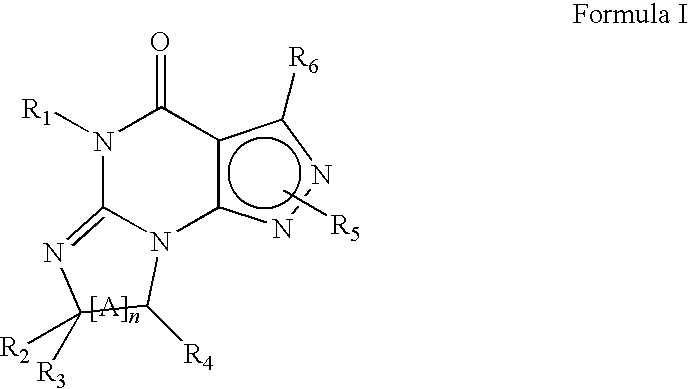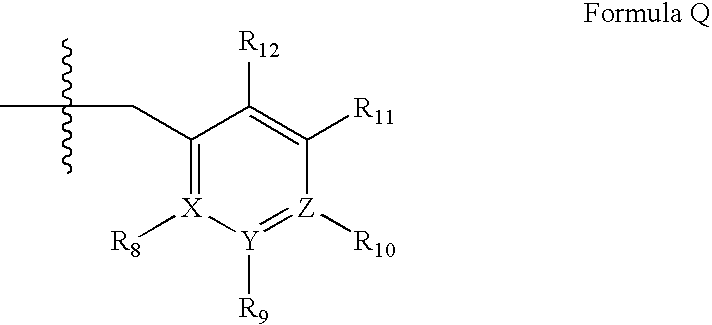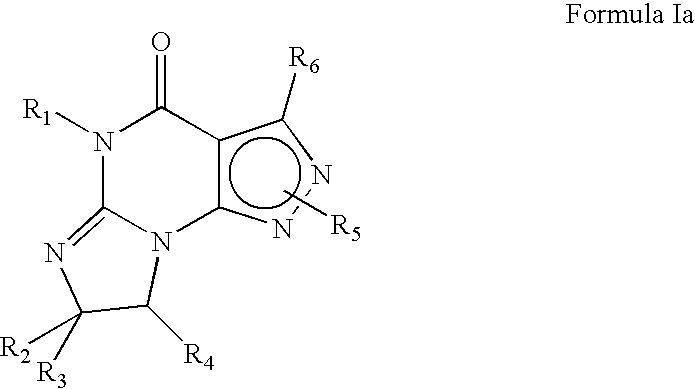Novel uses
a technology of phosphodiesterase and compound, applied in the field of new uses, can solve the problems that compound is not taught or suggested to be useful, and achieve the effects of selective inhibition of phosphodiesterase 1 activity, treatment or prophylaxis of conditions, and enhancement of progesterone signaling pathways
- Summary
- Abstract
- Description
- Claims
- Application Information
AI Technical Summary
Benefits of technology
Problems solved by technology
Method used
Image
Examples
examples
1. Measurement of PDE1B inhibition in vitro using IMAP Phosphodiesterase Assay Kit
[0428]Phosphodiesterase 1B (PDE1B) is a calcium / calmodulin dependent phosphodiesterase enzyme that converts cyclic guanosine monophosphate (cGMP) to 5′-guanosine monophosphate (5′-GMP). PDE1B can also convert a modified cGMP substrate, such as the fluorescent molecule cGMP-fluorescein, to the corresponding GMP-fluorescein. The generation of GMP-fluorescein from cGMP-fluorescein can be quantitated, using, for example, the IMAP (Molecular Devices, Sunnyvale, Calif.) immobilized-metal affinity particle reagent.
[0429]Briefly, the IMAP reagent binds with high affinity to the free 5′-phosphate that is found in GMP-fluorescein and not in cGMP-fluorescein. The resulting GMP-fluorescein-IMAP complex is large relative to cGMP-fluorescein. Small fluorophores that are bound up in a large, slowly tumbling, complex can be distinguished from unbound fluorophores, because the photons emitted as they fluoresce retain t...
example 2
PDE 1 Inhibitor Effect on Sexual Response in Female Rats
[0436]The effect of PDE1 inhibitors on Lordosis Response in female rats is measured as described in Mani, et al., Science (2000) 287: 1053. Ovariectomized and cannulated wild-type rats are primed with 2 μg estrogen followed 24 hours later by intracerebroventricular (icy) injection of progesterone (2 μg), PDE1 inhibitors of the present invention (0.1 mg and 2.5 mg) or sesame oil vehicle (control). The rats are tested for lordosis response in the presence of male rats. Lordosis response is quantified by the lordosis quotient (LQ=number of lordosis / 10 mounts×100). The LQ for estrogen-primed female rats receiving compounds 1 or 2, even at 0.1 mg, is over 75, similar to estrogen-primed rats receiving progesterone and significantly higher (p<0.001) than for estrogen-primed rats receiving vehicle.
PUM
| Property | Measurement | Unit |
|---|---|---|
| pH | aaaaa | aaaaa |
| pH | aaaaa | aaaaa |
| concentrations | aaaaa | aaaaa |
Abstract
Description
Claims
Application Information
 Login to View More
Login to View More - R&D
- Intellectual Property
- Life Sciences
- Materials
- Tech Scout
- Unparalleled Data Quality
- Higher Quality Content
- 60% Fewer Hallucinations
Browse by: Latest US Patents, China's latest patents, Technical Efficacy Thesaurus, Application Domain, Technology Topic, Popular Technical Reports.
© 2025 PatSnap. All rights reserved.Legal|Privacy policy|Modern Slavery Act Transparency Statement|Sitemap|About US| Contact US: help@patsnap.com



